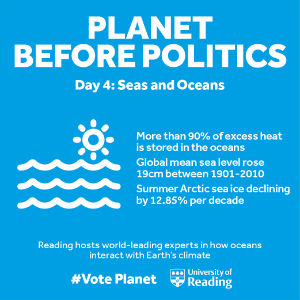#VotePlanet: Sea level rise threat will exist ‘for centuries to come’
08 December 2019

Devastating coastal flooding and an ice-free Arctic are real dangers the world faces due to climate change.
As polar sea ice continues to melt due to rising temperatures, coastal communities and low-lying islands are in danger of being eroded or even wiped out by resulting rises in sea levels. Changing ocean temperatures also affect global weather systems as well as threatening marine life.
Reading research is seeking to estimate the impact of these changes, as well as what is contributing to them.
Professor Jonathan Gregory, world-leading scientist on sea level rise at NCAS and the University of Reading, said: “Sea-level rise may be inevitable, but this should not lead us to inaction. Even in the best emission reduction scenario, sea-level rise is not stabilised at the end of the 21st century. It will proceed for many centuries to come, because the time scale for the warming of the deep ocean is centuries or millennia.
“However, we can have an influence on how much and how fast it will happen. We can’t stop the increase, but it is not too late to do something to mitigate it and reduce its impact.”
Professor Gregory was presented with a BBVA Foundation Frontiers of Knowledge Award earlier this year for advancing the understanding of how sea levels will rise due to climate change.
Studies on phytoplankton and algae, which provide the base for marine food chains, have shown it is now able to grow underneath Arctic sea ice, which has got thinner and darker due to warming temperatures. This has the potential to significantly disrupt the Arctic food chain.
Reading environmental scientist Dr Shovonlal Roy pioneered a method of using satellite images to estimate the nutritional value of phytoplankton in the world’s main coastal regions, which provide a large part of the world’s commercial fish stocks. This also revealed their vulnerability to future climate change.
As well as negative implications of melting sea ice, shipping companies could utilise new routes directly over the North Pole. Reading scientists have calculated which routes may become possible in future.
Other Reading research has focused on changes to Antarctic sea ice cover, marine ‘heatwaves’ and contributed to the IPCC’s Special Report on the Ocean and Cryosphere in a Changing Climate.
#VotePlanet
The University of Reading’s #VotePlanet campaign is highlighting the biggest threats facing the UK and global environment, as well as how research and action can combat them, in the lead up to the General Election on December 12.
Public concern for the environment has increased significantly in recent years, with political parties unveiling various eco-friendly pledges in their election manifestos.
The #VotePlanet campaign therefore aims to inform voters on the science behind these issues, and what sustainability action it is taking as an institution.
Follow the campaign on Twitter, Facebook and Instagram, and on the University news page. Get involved and share your examples of sustainable action using the hashtag #VotePlanet.
